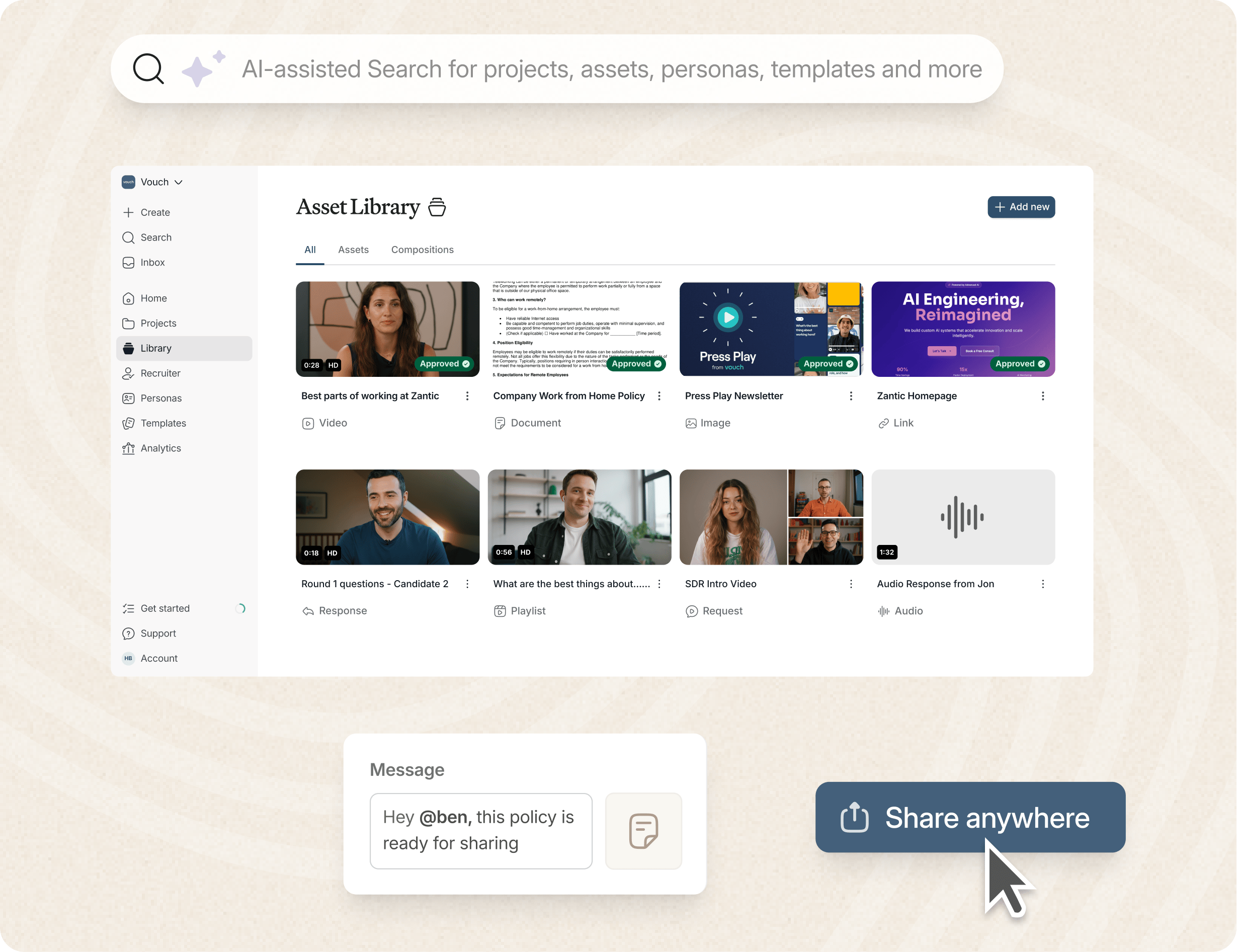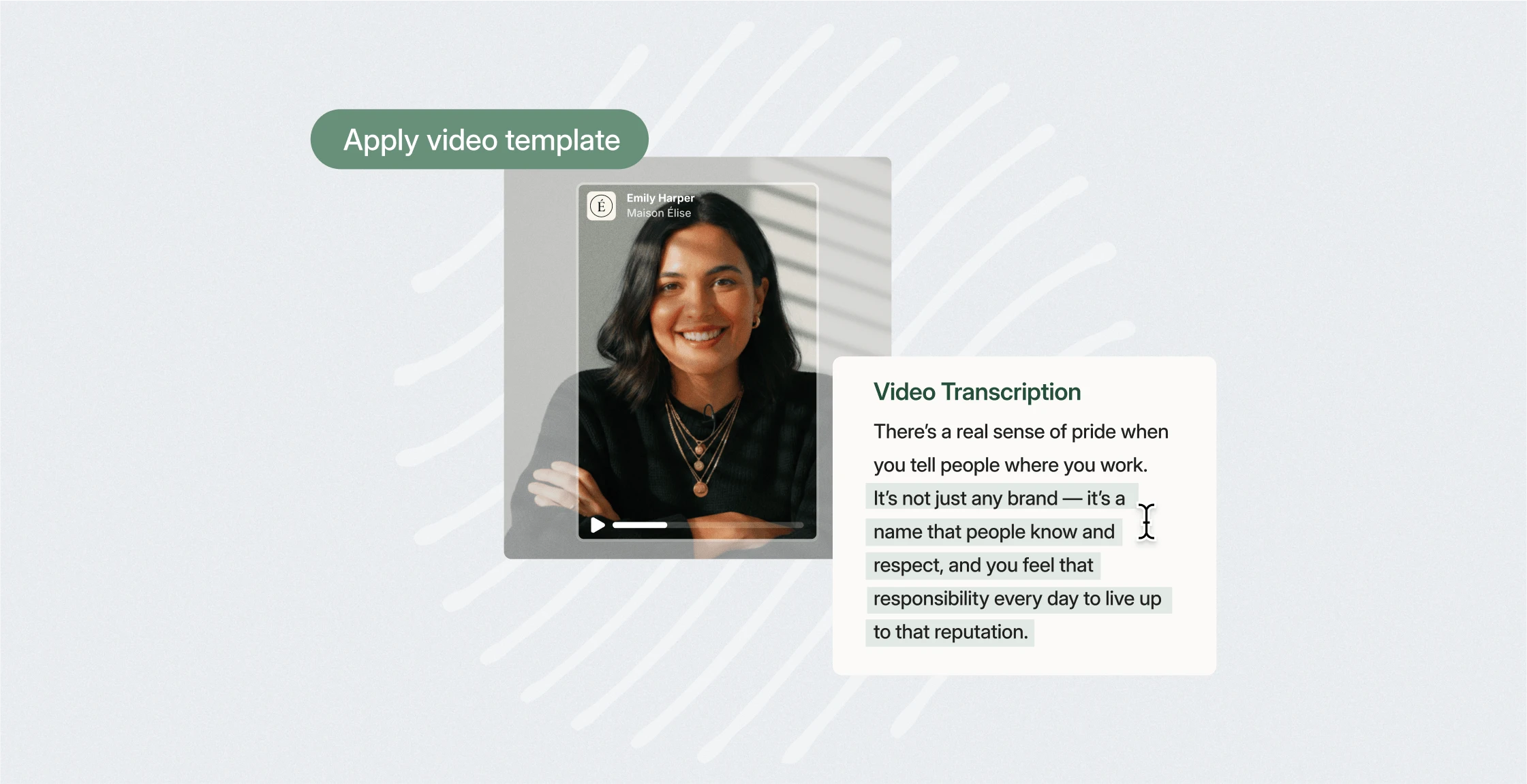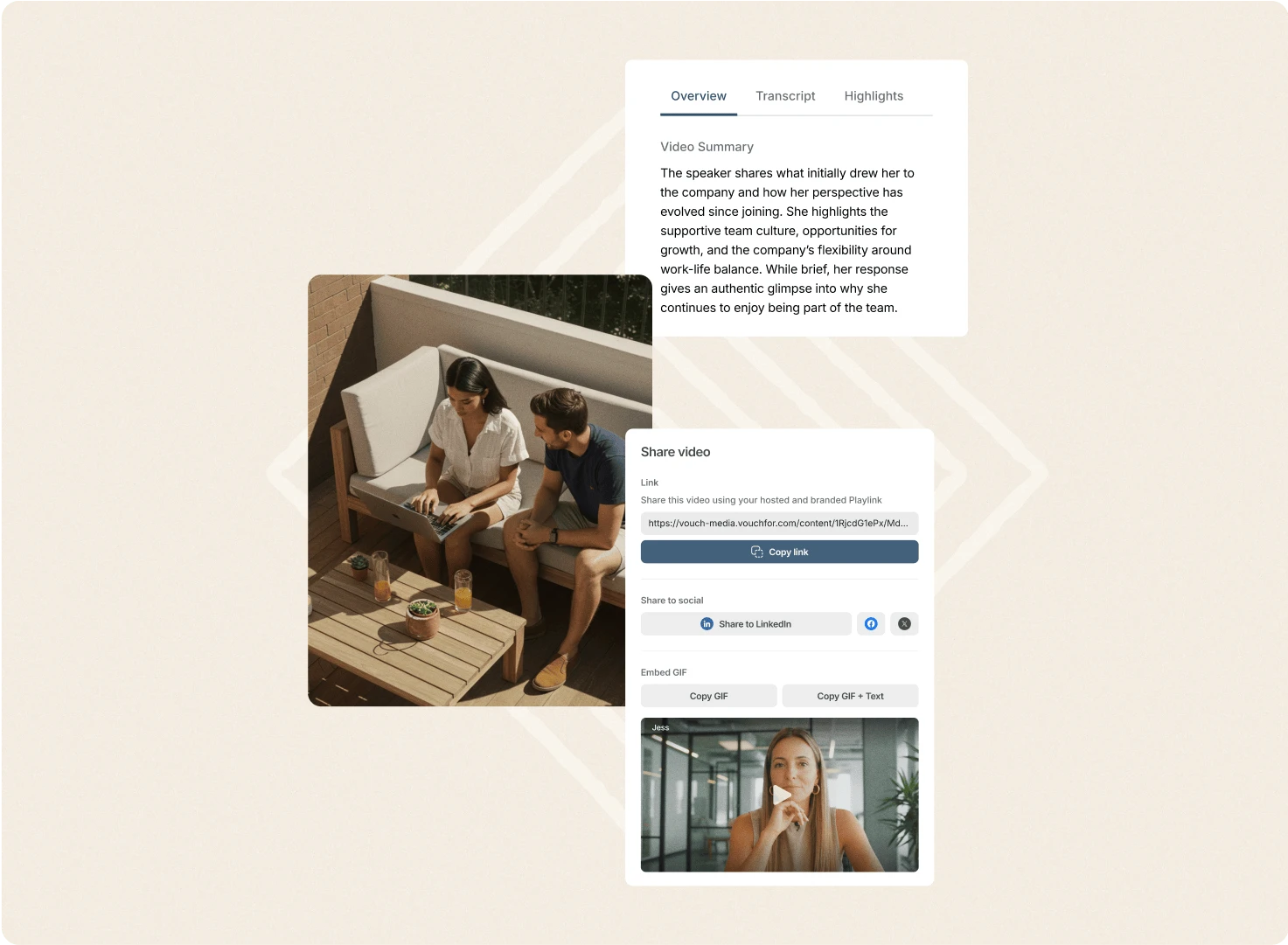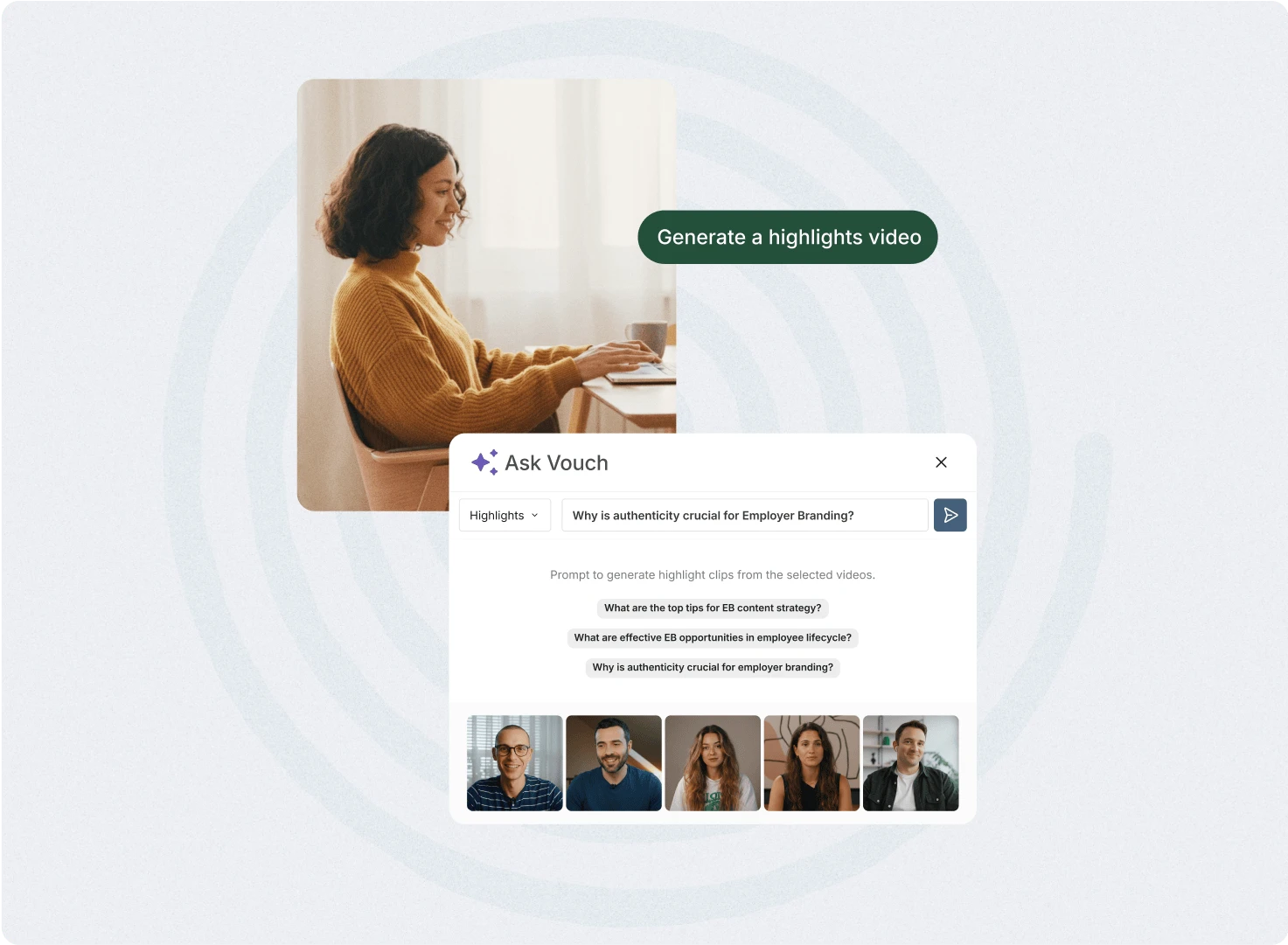In the world of events companies in 2026, it's not just the clients you have to impress to win them over and retain them - it's your team, too.
With a surge in demand for digital experiences, hybrid events, and experiential marketing, companies in this space must evolve their employer branding strategies to stand out and attract the right talent.
From planners to creatives to coordinators, events companies compete in a tight market for top-tier talent.
Here's a breakdown of seven actionable employer branding steps that will position your company as a strong, forward-thinking employer.
Let's get started:
Step 1. Showcase Your Employee's Voices With Vouch
Want to cut through the noise? Let your people do the talking.
Vouch is a simple yet powerful video tool that enables you to create real, unscripted employee testimonials and day-in-the-life clips.
Why use Vouch:
- Trusted by global brands and loved by recruiters
- Brings your employer value proposition (EVP) to life
- Easily shared across job postings, social media platforms, and internal communications
Fact: According to LinkedIn, job seekers are 3x more likely to trust employees than the company when it comes to insights about company culture.
Use Vouch to highlight your commitment to flexibility, employee development, or positive workplace culture in short-form video content from your team.
Step 2. Define a Strategic Employer Value Proposition (EVP)
Your EVP is not a slogan - it's the strategic foundation of your employer brand. It communicates what makes you a compelling employer to both current employees and potential candidates.
A solid EVP should reflect:
- Opportunities for career growth and employee development
- A collaborative workplace culture
- Flexible work arrangements (remote, hybrid, or flexible hours)
- Comprehensive wellness programs and mental health support
Example: Eventbrite promotes a "culture of learning" with an emphasis on innovation, skill development programs, and work-life balance, all clearly laid out in their careers section.
The AI-enabled workspace for talent teams.
- Unified workspace for talent teams
- Accelerate hiring with AI tools
- Auto-generate polished hiring and employer brand content
- Easily repurpose assets across all channel

Step 3. Invest in Internal Culture and Communication
Employee engagement begins internally. A great external employer brand is only possible when the internal culture is thriving.
Best practices:
- Use employee tools like Vouch and surveys to gather feedback about company goals and culture
- Celebrate employee achievements and milestones in internal newsletters or team meetings
- Clearly communicate strategic goals and connect them to individual contributions
Why it matters: According to Gallup, highly engaged teams show 21% greater profitability and up to 59% less turnover.
Step 4. Streamline Your Application Process
Nothing kills employer branding faster than a poor application process. It's often the first real experience a potential employee has with your brand.
To improve candidate attraction:
- Clearly define roles and expectations in job descriptions
- Keep the application short, mobile-friendly, and transparent
- Communicate proactively during the recruitment process
Insight: According to Glassdoor, companies with a transparent and streamlined hiring process improve candidate conversion by 30%.
Step 5. Promote a Consistent Employer Brand Across Digital Touchpoints
Your branding should be consistent with your corporate identity and your job ads.
How to align your brand message:
- Design visual identity elements that align with your company values
- Use consistent employer branding messages across your career site, LinkedIn, and job boards
- Keep your tone, visuals, and messaging aligned with your broader corporate marketing strategy
Example: Brands like George P. Johnson successfully maintain visual consistency across all platforms, reinforcing their status as a pioneer in employer brand in the events space.
Step 6. Leverage Employee Ambassadors and Peer Networks
In events companies, where culture and collaboration are everything, your current employees are your most powerful recruiters.
Tap into employee voices by:
- Encouraging staff to share employee-generated content
- Recognizing high performers as employee ambassadors
- Creating a "Content Corner" where teams can share their favorite events, projects, and behind-the-scenes stories
Statistics: According to Edelman Trust Barometer, employees are the most trusted source of information about a business - more than CEOs or executives.
Step 7. Host Internal Events That Reflect Your Culture
You run unforgettable events for clients. Why not do the same for your team?
Internal events boost:
- Employee engagement and sense of belonging
- Opportunities for mentorship and team collaboration
- A positive employee experience that aligns with your public brand
Try:
- Quarterly town halls with transparent reporting
- Mini skill-sharing festivals or bootcamps
- Fun, low-pressure networking events that bring remote or hybrid teams together
Example: Event companies like Bizzabo regularly highlight internal events to show their culture of collaboration and community.
Who Are The Top 10 Events Companies Globally?
1. Informa plc
- 🇬🇧 UK-based; global exhibitions leader.
- Revenue: £3.55 billion
2. Live Nation Entertainment
- 🇺🇸 Concerts, festivals, and ticketing (owns Ticketmaster).
- Revenue: ~US $23 billion
3. Freeman
- 🇺🇸 Event production and logistics specialist.
- Revenue: ~US $1–1.5 billion
4. Reed Exhibitions (RELX)
- 🇬🇧 Runs global trade shows and expos.
- Revenue: Part of RELX’s ~$11 billion
5. CWT Meetings & Events
- 🌍 Corporate meetings & event planning in 145+ countries.
- Revenue: ~US $1.5 billion
6. Clarion Events
- 🇬🇧 Trade shows and conferences; Blackstone-owned.
- Revenue: £433 million
7. AEG (Anschutz Entertainment Group)
- 🇺🇸 Global venue operator and live event producer.
- Revenue: ~US $1–2 billion
8. ASM Global
- 🌍 Manages stadiums, arenas, and convention centers.
- Revenue: ~US $1–2 billion
9. George P. Johnson (GPJ)
- 🇺🇸 Experience marketing for corporate events.
- Revenue: ~US $300–500 million
10. MCH Group
- 🇨🇭 Swiss-based; runs Art Basel and other global fairs.
- Revenue: CHF 493 million
Summary
In today's dynamic events industry, being a successful employer goes beyond perks and paychecks.
It's about delivering an authentic, consistent, and meaningful employee experience that mirrors your external brand promise.
By following these seven steps, events companies can attract future talents, increase retention rates, and become preferred employers in a rapidly evolving business landscape.
FAQs
What is employer branding in the events industry?
It's how events companies position themselves as desirable employers to attract and retain talent.
How do I start building an employer brand?
Start with your EVP and amplify it with employee testimonials and consistent messaging.
Why use video for employer branding?
It humanizes your message and builds trust with potential candidates.
What makes a strong EVP for an events company?
Career growth, creative autonomy, flexibility, and a vibrant workplace culture.
How do you engage current employees in branding efforts?
Empower them to share stories, celebrate wins, and contribute content.
Can small event companies compete with larger agencies?
Absolutely. A genuine culture and personalized candidate experience goes a long way.
Why does internal culture matter for branding?
Because employee satisfaction reflects externally, and impacts your reputation.
See Why Employer Branding Managers Love Vouch!
Loved by companies like Canva, Nike, Cisco, HubSpot, Amazon, and more, tools like Vouch make leveraging video content in your business remarkably easy.
Be sure to book a Vouch demo today and chat with an employer branding expert.
You might also like

Elevate Your Brand Today With Vouch
Discover how Vouch can accelerate talent acquisition while helping you stay on-brand.






